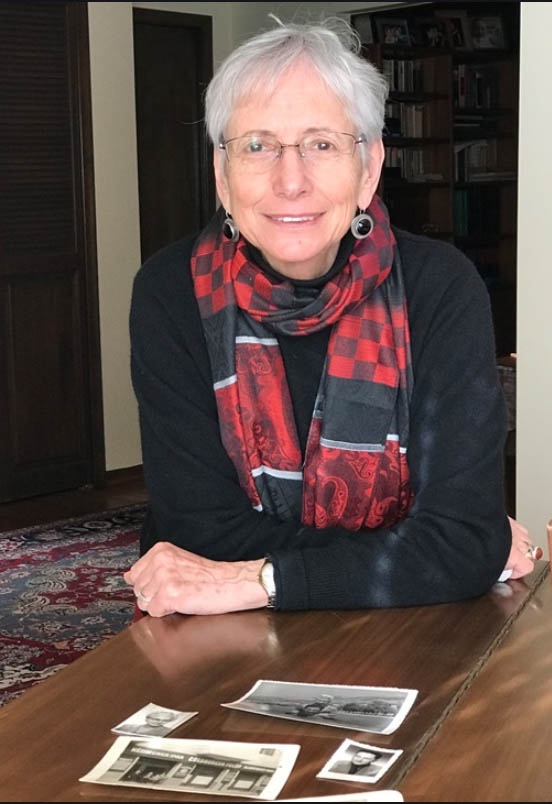COE alumna and World War II refugee Noemi Ebenstein sees herself in Syrian refugee study
Noemi Ebenstein was 4 years old when she became a refugee.

The Hungary native and Southfield, Mich., resident - who, with her mother and older brother evaded imprisonment in World War II Nazi concentration camps -- is a semi-retired clinical psychologist in her 70s who made it her life's work to help people deal with emotional pain, including that caused by post-traumatic stress disorder.
Ebenstein was born in 1941 to Zionists who believed in education and dignity above all else. She earned her doctorate from the Wayne State University College of Education in 1976.
Dr. Ebenstein also holds a bachelor's degree from Hebrew University in Jerusalem, where she met her husband. In the 1960s, the couple spent five years in San Francisco and neighboring Berkley, Calif., where she fell in love with the concepts of group therapy, despite many leaders of it in California lacking the appropriate formal education. The couple soon moved to Detroit. Here, at WSU, the College of Education's Mildred Peters tailored a doctorate program for her, in Guidance and Counseling, Ebenstein said.
"I wanted to be a therapist," she said.
One February day in 2017, sitting in her Southfield home, Ebenstein read her copy of The Jewish News. In it was an article about Syrian refugees in southeast Michigan who were interviewed as part of a study at the Wayne State University School of Medicine.
The article showcased preliminary results of "Risk and Resilience in Syrian Refugees," an ongoing study led by Assistant Professor of Psychiatry and Behavioral Neurosciences Arash Javanbakht, Ph.D., that measures the impact of violence on Syrian refugee children and families, specifically the mental health impact and biological correlation of civil war trauma on Syrian refugees now living in the United States. In all, 30 percent of adult refugees experience post-traumatic stress disorder and 50 percent experience depression. In addition, 60 percent of Syrian children show signs of anxiety because of the trauma - very likely impacted by their mother's PTSD, Dr. Javanbakht said.
The article included a phone number to call to donate to the study. It took Dr. Ebenstein a month to process how closely the article hit home for her.
"I identified with them and I identified with the children. My heart was breaking for these people, so it brought back memories. I was a refugee child," she said. "This article caught my eye because I have worked with people (with PTSD) over the years. PTSD is not that uncommon, and I myself have a little bit of that. It pushed a button for me."
She picked up the phone.
"Noemi's donation is very precious to us, as it comes from deep understanding of the suffering of the refugees," Dr. Javanbakht said. "She is an example of a person with integrity, who has transformed her own pain to a meaningful cause to serve and protect others who suffer. We need more people with this level of empathy and maturity."
Ebenstein said that for her, "1945 to 1948 were years of turbulence."
Her parents were imprisoned for their Zionist beliefs in 1945. Her mother went to a common women's prison, and her father was placed in what she called an "intellectual prison."
"For me, my world fell apart. That was a hard time for me because I was all alone. I was shuffled from here to there. I was 6," she said. "The message of hope and faith keeps you going. My parents believed in education. When we had nothing, I still had an education."
Ebenstein recalls that her mother wanted only three things for them as refugees -- food, shelter and an identity.
"The refugees need to hold on to their identity. They can reclaim part of that identity. It is important to hold on to your dignity, because then it is easier for you to face the hardships," she said. "I really believe that my story is fairly typical of the Jewish experience in Europe. Refugees had a life before they became refugees."
After an Allied army liberated the country in April 1945, Ebenstein and her mother and brother walked to Bratislava in Czechoslovakia. At a soup kitchen and shelter, her mother recognized someone she knew, a sister of a friend, who arranged to have them driven home to Budapest, Hungary. The family, then reunited with her father, moved to Israel in 1948.
She now hopes to volunteer or assist the refugees who are part of the School of Medicine's study.
"Believe there will be better times. You go through hell, but you can rise above it," Ebenstein said.
This article was posted on the School of Medicine website.